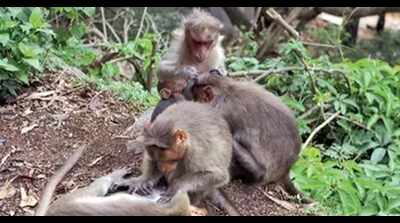ARTICLE AD BOX

Have you ever heard of Kyasanur forest disease, or KFD? If not, you are not alone. But if you live or work in or near a forested area in Goa, this is a disease worth knowing about.KFD is a viral illness that spreads between animals and humans; experts call this a zoonotic disease.
Specifically, it is transmitted by infected ticks that live in forested areas and feed on several types of animals, including mice, monkeys, and cattle.World Zoonoses Day falls on Sunday.As for monkeys, in contrast to other animals, infected monkeys can also develop visible disease symptoms, which is why the disease is also sometimes called monkey fever. Symptoms of KFD can include high fever, body aches, vomiting, and in severe cases, internal bleeding, and even death.Once a person gets sick, doctors can only help alleviate the symptoms but not treat the virus directly. The best approach is therefore to avoid an infection in the first place.In Goa, KFD has affected communities who live or work near forests, especially cashew farmers, although steps have already been taken over the past years to control the disease. These farms are often located right at the edge of a forest, where people are more likely to come into contact with infected ticks.
People are at higher risk when they enter forested areas for activities like farming, collecting firewood, or taking animals out for grazing. The risk is also linked to environmental changes, like the expansion of settlements or plantations into previously forested areas, which brings people, ticks, and wildlife into closer contact.Simple measures like wearing full-sleeved clothing, using tick repellents, and thoroughly checking for ticks after time outdoors can make a big difference and reduce the risk of getting infected with KFD.To curb infection and respond effectively, the One Health & Agroecology Project is working in Sattari taluka in North Goa to bring people and institutions together. This project is a collaborative initiative by Indian and German govts, and Goa is one of the states where activities are carried out according to the ‘One Health’ approach.This concept recognises that the health of people, animals, and ecosystems is closely connected.In practice, the project brings to panchayats the collaboration of forest, environment, animal husbandry, and public health departments. The project works to improve tick surveillance, promote early disease detection, develop clear procedures for outbreak response, and raise awareness through community outreach.Most importantly, it supports members of local communities to protect themselves better, because they are the first line of defence.This World Zoonoses Day is a reminder that our health does not exist in isolation. When we look after forests, animals, and communities together through science, cooperation, and local knowledge, we all stay safer.The writers are Dr Pradip Sarmokadam of Goa State Biodiversity Board, and Dr Angela Schug and Dr Stefanie Preuss from Indo-German Development Cooperation



.png)
.png)
.png)
















 9 hours ago
7
9 hours ago
7









 English (US) ·
English (US) ·